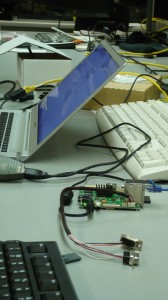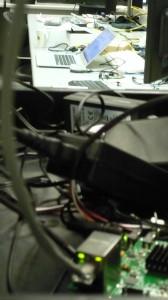Gentoo Oracle JDK on ARM
Installing a JDK on ARM has several challenges. First, there is no binary icedtea for ARM. Second, building icedtea generates circular build time dependencies.
On my first attempt, I just ran the following commands:
dispatch-conf
emerge virtual/jdk
However, it soon met an error:
* Package: dev-java/icedtea-bin-6.1.12.6-r1
* Repository: gentoo
* Maintainer: java@gentoo.org
* USE: alsa arm elibc_glibc kernel_linux userland_GNU
* FEATURES: preserve-libs sandbox userpriv usersandbox
>>> Unpacking source...
* ERROR: dev-java/icedtea-bin-6.1.12.6-r1::gentoo failed (unpack phase):
* Nothing passed to the 'unpack' command
*
* Call stack:
* ebuild.sh, line 93: Called src_unpack
* environment, line 2546: Called unpack
* phase-helpers.sh, line 291: Called die
* The specific snippet of code:
* [ -z "$*" ] && die "Nothing passed to the 'unpack' command"
*
* If you need support, post the output of `emerge --info '=dev-java/icedtea-bin-6.1.12.6-r1::gentoo'`,
* the complete build log and the output of `emerge -pqv '=dev-java/icedtea-bin-6.1.12.6-r1::gentoo'`.
* The complete build log is located at '/var/tmp/portage/dev-java/icedtea-bin-6.1.12.6-r1/temp/build.log'.
* The ebuild environment file is located at '/var/tmp/portage/dev-java/icedtea-bin-6.1.12.6-r1/temp/environment'.
* Working directory: '/var/tmp/portage/dev-java/icedtea-bin-6.1.12.6-r1/work'
* S: '/var/tmp/portage/dev-java/icedtea-bin-6.1.12.6-r1/work/icedtea-bin-6.1.12.6'
Later, when I checked on gentoo-packages, it didn’t have an arm ebuild. Oracle has hardfloat and softfloat binary JDKs for ARM, so I went on to install them. They can be used to bootstrap an icedtea build.
* IMPORTANT: 1 news items need reading for repository 'gentoo'.
* Use eselect news to read news items.
* Last emerge --sync was 92d 19h 31m 27s ago.
These are the packages that would be merged, in order:
Calculating dependencies... done!
[ebuild N ] media-fonts/dejavu-2.33 USE="-X -fontforge" 4,767 kB
[ebuild N ] media-libs/freetype-2.4.11:2 USE="bindist bzip2 -X -auto-hinter -debug -doc -fontforge (-infinality) -static-libs -utils" 1,510 kB
[ebuild N ] virtual/ttf-fonts-1 0 kB
[ebuild N ] media-libs/fontconfig-2.10.92:1.0 USE="-doc -static-libs" 1,490 kB
[ebuild N ] app-admin/eselect-fontconfig-1.0 0 kB
[ebuild N F *] dev-java/oracle-jdk-bin-1.7.0.40:1.7 USE="fontconfig -X -alsa
-derby -doc -examples -jce -nsplugin -pax_kernel -source" 138,494 kB
Total: 6 packages (6 new), Size of downloads: 146,260 kB
Fetch Restriction: 1 package (1 unsatisfied)
Fetch instructions for dev-java/oracle-jdk-bin-1.7.0.40:
*
* Oracle requires you to download the needed files manually after
* accepting their license through a javascript capable web browser.
*
* Download the following files:
* jdk-7u40-linux-arm-vfp-sflt.tar.gz
* jdk-7u40-linux-arm-vfp-hflt.tar.gz
* at 'http://www.oracle.com/technetwork/java/javase/downloads/jdk7-downloads-1880260.html'
* and move them to '/distfiles'
*
The following keyword changes are necessary to proceed:
(see "package.accept_keywords" in the portage(5) man page for more details)
# required by dev-java/oracle-jdk-bin (argument)
=dev-java/oracle-jdk-bin-1.7.0.40 **
The following license changes are necessary to proceed:
(see "package.license" in the portage(5) man page for more details)
# required by dev-java/oracle-jdk-bin (argument)
>=dev-java/oracle-jdk-bin-1.7.0.40 Oracle-BCLA-JavaSE
NOTE: The --autounmask-keep-masks option will prevent emerge
from creating package.unmask or ** keyword changes.
Use --autounmask-write to write changes to config files (honoring
CONFIG_PROTECT). Carefully examine the list of proposed changes,
paying special attention to mask or keyword changes that may expose
experimental or unstable packages.
You may not have a browser installed on your ARM board, so I suggest just uploading the Oracle tarballs to a server and using wget to download them.
To fix the control panel error when you don’t have a desktop environment installed, you need to remove lines from the ebuild and digest it.
These lines need to be removed:
sun-jcontrol-${PN}-${SLOT}.png || die
sed -e "s#Name=.*#Name=Java Control Panel for Oracle JDK ${SLOT}#" \
-e "s#Exec=.*#Exec=/opt/${P}/jre/bin/jcontrol#" \
-e "s#Icon=.*#Icon=sun-jcontrol-${PN}-${SLOT}#" \
-e "s#Application;##" \
-e "/Encoding/d" \
jre/lib/desktop/applications/sun_java.desktop \
> "${T}"/jcontrol-${PN}-${SLOT}.desktop || die
domenu "${T}"/jcontrol-${PN}-${SLOT}.desktop
Once removed, generate the manifest for it.
If you run emerge dev-java/oracle-jdk-bin, it will succeed.

